Transcription
Legislative Branch of the Government
Massachusetts State House
Boston, Massachusetts 02133
August 26, 2019
Dear Legislators,
My name is Luis D. Perez, W33937 and I am serving a first
degree life sentence without parole since my arrest on May 6th,
1971.
I am writing this letter in support of prison reform, in particular
the Initiative of Bill #S.826/H.3359, now pending in a Committee.
There are many issues of great concern to me and I am hoping that
my main concern can be brought up for debate in case those bills reach
the floor out of Committee.
Please note that I am using my criminal case to address the
life sentence that we received after July 30, 1972, when the
U.S. Supreme court declared the death penalty unconstitutional
under Furman v. Georgia 408 U.S. 238 (1972).
Enclosed with this letter you will find the Constitutional
Construction of Chapter 265 1 and the punishment stage of
2 of those individuals who are found guilty of first degree
murder. - You also will find the dissenting opinion of Justice
O'Connor.
It is very important that you be aware that from July 30,
1972 to 1979, 488 § 2 and 1982 555 § 3, people convicted of first degree murder were sentenced to life without parole. The trial Judge did not have Judicial Authority to sentence individuals to life because there was NO CONSTITUTIONAL MANDATED LAW FROM THE LEGISLATIVE BRANCH OF GOVERNMENT ALLOWING A JUDGE TO SENTENCE SOMEONE TO A LIFE SENTENCE.
Another aspect for review and consideration is that the other States who had death penalty statutes like the State of Florida-ordered a MORATORIUM until the Legislature ordered the necessary adjustment of the law after the case of FURMAN.
The illegality of the life sentences in Massachusetts came as a result of not having a saving clause or statutory severability clause between the sentence statutes of Chapter 265 §1 and §2. In other words, people by law can be arrested for murder, but can't be sentence to life until an order from the Legislature after the case of FURMAN.
OVER
CONSTITUTIONAL CONSTRUCTION OF
CHAPTER 265 §1 and §2.
The other Constitutional Flaw in Massachusetts is the separation of power between the 3 Branches of Government and the fact that for decades the Judicial Branch has overpowered the Legislative Branch. It is well known that no Court in this country can enlarge its authority, or legislate from the bench. It is like the Willie Horton Political Fiasco that 33 years later continues beating a death horse by being politically correct and follow the political pressure without caring of correcting the Constitutional flaws.
The only evidence that I have in practice in support my claim is the dissenting opinion of Justice O'Connors on my appeal process. You can read discretionary power that Judges have acknowledge that Furman V. Georgia, did not have a sentencing guideline.. - The capital punishment laws of no less than 39 States and the District of Columbia are NULLIFIED. That is the reason why my co-defendant was allowing a sentence of a six-year term of probation on pleading guilty to 2nd degree murder.
CONCLUSION
Between 1972 and 1982, Massachusetts Criminal Law was function under A NULL AND VOID STATUTES.
Therefore, I am hoping that you take my letter into consideration and further pass the LIFERS BILLS RE-TROACTIVELY or WITH THE PRESUMPTIVE PAROLE ATTACHED TO THE LEGISLATURE'S ACTS.
Respectfully yours,
[Signature of Luis D. Perez]
http://betweenthebars.org/blogs/350
Luis D. Perez #W-33937
NCCI-GARDNER
P.O. Box 466
Gardner, Massachusetts 01440
CC: Members of the Media
SJC/09240
COMMONWEALTH vs. LUIS PEREZ.
August 13, 2004.
Supreme Judicial Court, Superintendence of inferior courts. Practice, Criminal, Sentence, Capital case. Constitutional Law, Sentence.
Luis Perez appeals from the denial by a single justice of this court of his application, pursuant to G. L. c. 278, § 33E, for leave to appeal from the denial of his most recent motion for a new trial. The Commonwealth has moved to dismiss the appeal, and we agree that it should be dismissed.
In 1973, a jury convicted Perez of murder in the first degree, among other offenses. The judge sentences him to life imprisonment pursuant to G. L. c. 265, § 2. This court affirmed his conviction in Commonwealth v. Perez, 390 Mass. 308 (1983). Thirty years after his conviction, Perez now claims that his sentence was improper because the United States Supreme Court's decision in Furman v. Georgia, 408 U.S. 238 (1972) -- decided the year before Perez was convicted and eleven years before this court reviewed and affirmed his conviction -- nullified in its entirety the statute under which he was sentenced.
Perez's appeal suffers from two fundamental flaws. First, the decision of the single justice, acting as a gatekeeper pursuant to G. L. c. 278, § 33E, is "final and unreviewable." Napolitano v. Attorney Gen., 432 Mass. 240, 241 (2000), citing Commonwealth v. Ambers, 397 Mass. 705, 710-711 (1986), and Dickerson v. Attorney Gen., 396 Mass. 740, 742 (1986). For this reason alone, his appeal must be dismissed. Second, this court has repeatedly rejected similar challenges to the validity of G. L. c. 265, § 2. See Napolitano v. Attorney Gen., supra at 243 ("no rights of this plaintiff have been infringed whatsoever by the life sentences imposed in the first instance by the trial judge"); Valliere v. Superintendent of Mass. Correctional Insts., 429 Mass. 1024, 1025 (1999) ("By changing the death sentence to life imprisonment, this court did not infringe on any rights belonging to the petitioner. In effect, he ended up with the most lenient sentence he could have possibly received, given the convictions pf murder in the first degree"); Commonwealth v. Cassesso, 368 Mass. 124, 125 (1975) ("With the invalidation of the death penalty in discretionary circumstances, such as exist under the language of G. L. c. 265, § 2, the only remaining relevant permissible penalty is imprisonment for life. We arrive at this conclusion as matter of statutory construction. The jury have no remaining sentencing function. The judge must impose the sentence").
Appeal dismissed.
Luis Perez, pro se, submitted a brief.
The issues presented in this letter were addressed in State and Federal Courts, who are ruling that my claim does not rely on any "new rules of constitutional law, made retroactive to cases on collateral review by the Supreme Court, that was previously unavailable." My Habeas Corpus Petition was denied, but they never said that our claims was wrong.
United States Court of Appeals
For the First Circuit
No. 05-1256
LUIS D. PEREZ,
Petitioner,
v.
SUPERINTENDENT, BAY STATE CORRECTIONAL CENTER,
Respondent.
Before
Torruella, Lipez and Howard,
Circuit Judges.
JUDGMENT
Entered: April 19, 2005
The application for permission to file a second or successive habeas corpus petition is denied for two reasons: (1) petitioner presented the same claim in his prior petition filed under 28 U.S.C. § 2254; and (2) the claim does not rely on any "new rules of constitutional law, made retroactive to cases on collateral review by the Supreme Court, that was previously unavailable." See 28 U.S.C. § 2244(b) (1) and (2) (A).
By the Court:
Richard Cushing Donovan, Clerk.
By: MARGARET CARTER
Chief Deputy Clerk.
CONSTITUTIONAL CONSTRUCTION OF
CHAPTER 265 §1 and Ch. 265 § 2
The statutes of punishment of Chapter 265 §2, made several changes and was amended in 1951, 1955, 1956 - After Furman v. Georgia there was another amended in 1979 and 1982. - The Common Law Punishment of death for murder was adopted on June 16, 1780, the ratification date of our Constitution. - When the Legislature enacted the Statute of 1858, Chapter 154 §§ 1-7, they for the first time invoked a statute of mitigation. At that time there was not Saving Clause. - Mitigation meant that the Jury through their verdict determine the degree of guilt, which murder in the first degree was punishable by death, and second degree imprisonment for life. "The substitution of imprisonment for life, in place of death, is a mitigation in the eye of the law, it is everywhere so regarded, it is on the ground that the Executive Power of Commutation is founded." Commonwealth v. Gardner, (11 Gray) 77 Mass. 438, 443 (1858).
There was four statutes in place between 1956 and 1972 when Furman v. Georgia NULL AND VOID the Death Penalty Statutes in the United States and Massachusetts did not have a saving clause to protect Chapter 265 §1 and §2.
The mitigation of the law was as follow:-
(1) Upon a guilty verdict with no recommendation that death be no imposed, the Judge had to issue a mandatory death sentence.
(2) Upon a guilty verdict with the recommendation that death be not imposed, the Judge had to issue a mandatory life sentence without parole.
(3) Upon guilty verdict for rape-murder, the Judge had to issue a mandatory death sentence, because, according to the statute the jury could not recommend that death be not imposed, nor could the court record it.
(4) Upon a guilty verdict for second degree murder, the Judge had to issue mandatory life sentence with parole eligibility..
As enacted by the Legislature those for punishments were mandatory upon jury discretion and the only lawful punishments before FURMAN.
The other contrast between the U.S. Court Ruling and Massachusetts death penalty statutes without a saving clause is found on Furman v. Georgia, Supra; at U.S. 417 and reads as follow:
"At least for the present, it also bars the States and Federal Government from seeking sentences of death for defendants awaiting trial on charges for which capital punishment was heretofore a potential alternative". (July 30, 1971)
O'CONNOR, Justice (dissenting).
The defendant's convictions dependent on the jury's believing Alvarez, and the jury could not have believed both Alvarez and the defendant. Therefore, a comparison of their credibility was critical. The judge's instructions must be evaluated in that context. I believe that the effect of the jury charge "was to throw the weight of the judge's opinion [as to the relative credibility of Alvarez and the defendant] in the scales against the defendant," Commonwealth v. Foran, 110 Mass. 179, 180 (1872), and that this was error which created a substantial likelihood of a miscarriage of justice, requiring a new trial.
After summarizing the defendant's testimony, the judge instructed the jury that in weighing his testimony they were entitled to consider his interest in the outcome of the case. Then, after summarizing Alvatrez's testimony, the judge charged the jury that in weighing his testimony the jury could consider the fact that Alvarez inculpated himself as well as the defendant, that Alvarez told the court that he was aware that he was inculpating himself, and that when this was done Alvarez had counsel. The clear import of these instructions was that the defendant's testimony was self-serving, and therefore entitled to little weight, but that Alvarez's testimony was not self-serving but rather was against his own interest, and therefore was worthy of belief.
The instructions was erroneous for two reasons. First, determination of the credibility of witnesses is within the exclusive province of the jury, and must not be encumbered by the possible influence of the judge's opinion. Commonwealth v. Sneed, 376 Mass. 867, 870, 872, 383 N.E.2d 843 (1978). Commonwealth v. Barry, 9 Allen 276, 278-279 (1864). See G.L. c. 231, § 81. Second, the implication that Alvarez's testimony was against his interest was misleading because it suggested, without evidentiary support, and perhaps contrary to fact, that he had nothing to gain by it. See Commonwealth v. Barry, supra at 277, 278. Alvarez had bee indicted for murder in the first degree, armed robbery, arson, and larceny of a motor vehicle in connection with the events to which he testified. At the time of the defendant's trial, those indictments were still pending. Disposition of Alvarez's case had been continued repeatedly during the months prior to the defendant's trial. Alvarez may well have believed that his own conviction was likely and that assisting the Commonwealth would bring its reward. If Alvarez did gamble on earning the Commonwealth's favor, it would appear that he won. A week after the defendant was convicted, Alvarez appeared before the judge who presided over the defendant's trial and pleaded guilty to murder in the second degree, armed robbery, arson, and larceny of a motor vehicle. The judge sentenced Alvarez to concurrent sentences of seven to twenty years on the indictments for armed robbery and arson. Despite the mandate of G.L. c. 265, § 2, that second degree murder be punished by imprisonment for life, the judge sentences Alvarez to a six-year term of probation on the indictment for murder, the term to take effect at the expiration of the sentence imposed on the armed robbery indictment. The judge placed the indictment for larceny of a motor vehicle on file.
I agree with the court's statement that "we examine the charge in its entirety to determine its overall impact on the jury." Supra at 640. I do not agree, however, that statements in a jury charge indicating the judge's opinion of the credibility of particular witnesses, or direct or indirect misstatements of a witness's motivation in testifying, are corrected by general statements, no matter how many times repeated, that the jurors are the sole judges of the facts and that it is for them to decide hat weight will be given to the evidence. This is the holding of Commonwealth v. Foran, supra at 180. We cannot fairly assume that as a result of being told that it is for them to decide what witnesses are to be believed, jurors can be relied on to ignore the judge's proffered opinion as to the facts.
In my opinion, the jury instructions were erroneous because the were misleading as to a matter that was relevant to Alvarez's credibility and because the exclusive province of the jury to find facts was invaded by the judge. Because Alvarez's credibility was critical to the convictions, I believe that there is a substantial likelihood that a miscarriage of justice has occurred. G.L. c. 278, § 33E. Accordingly, I would reverse the convictions and order a new trial.
COM. v. PEREZ
Cite as 455 N.E.2d 632 (Mass. 1983)
Mass. 641
Other posts by this author
|
2023 feb 2
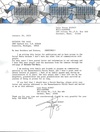
|
2022 dec 26
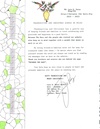
|
2022 nov 5
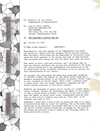
|
2022 aug 23

|
2022 jun 23
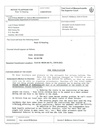
|
2022 may 4
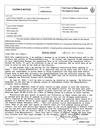
|
More... |

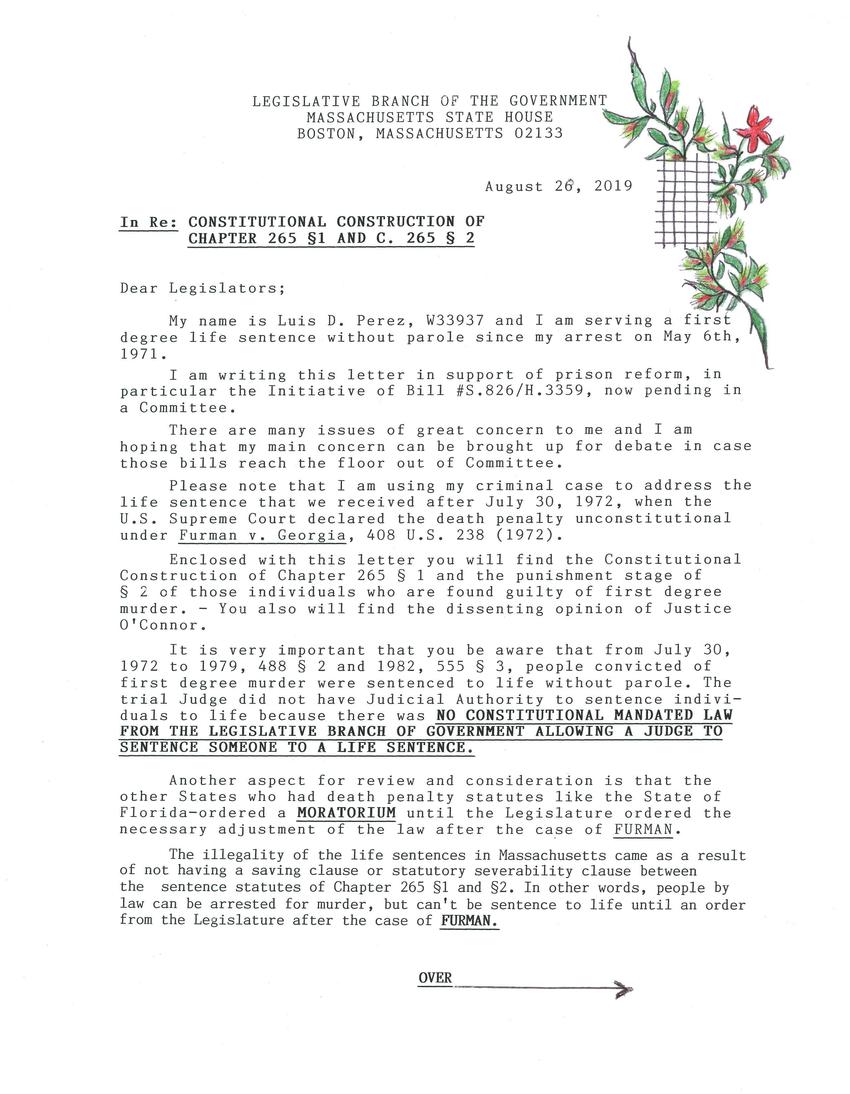
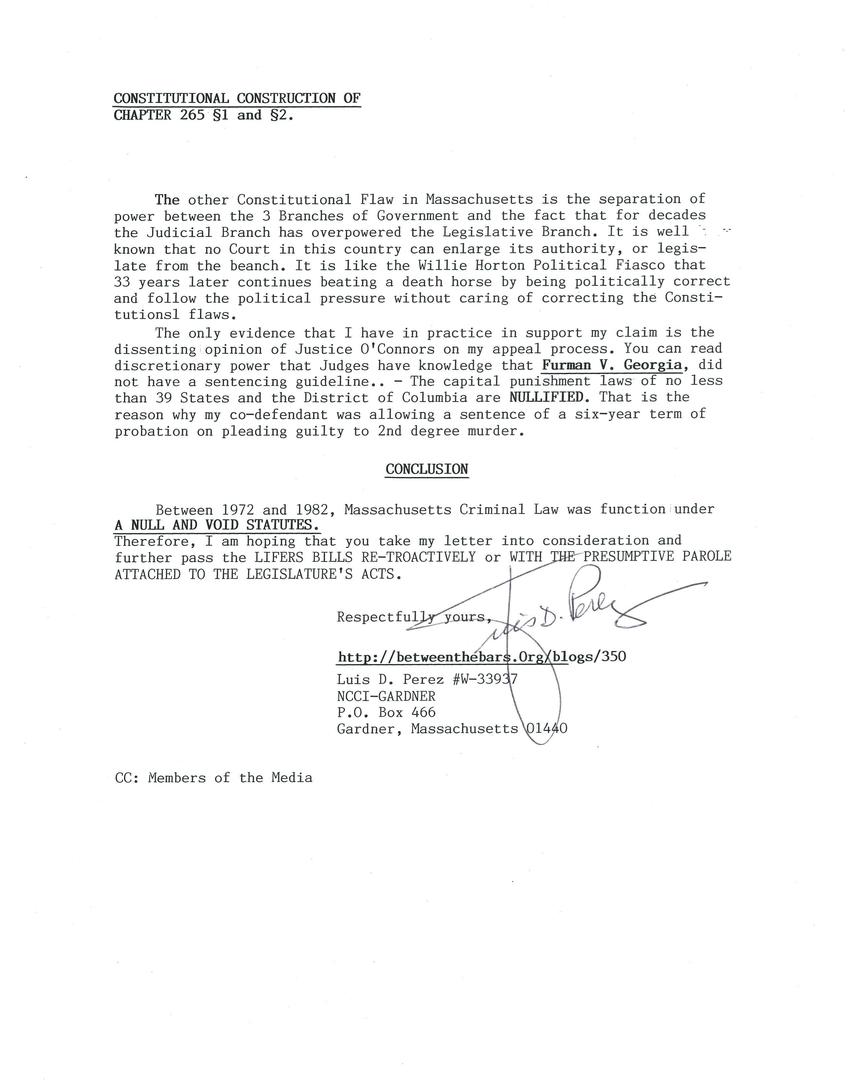
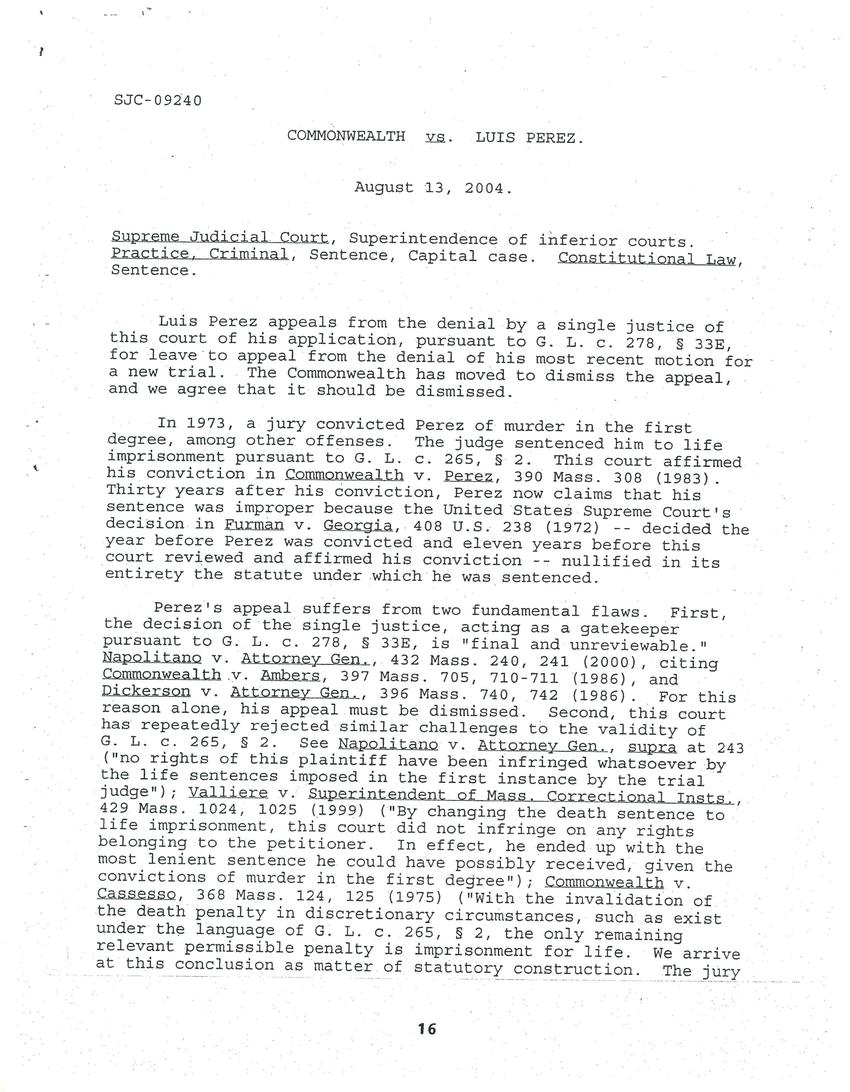
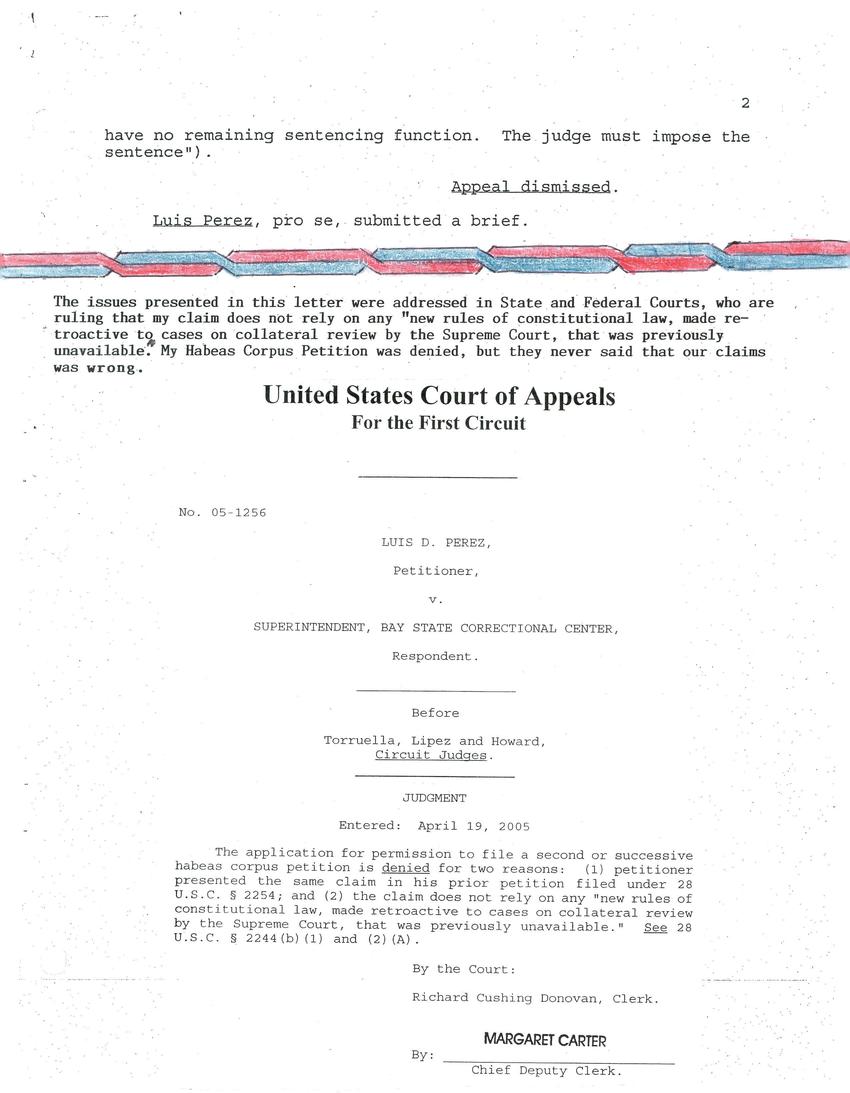
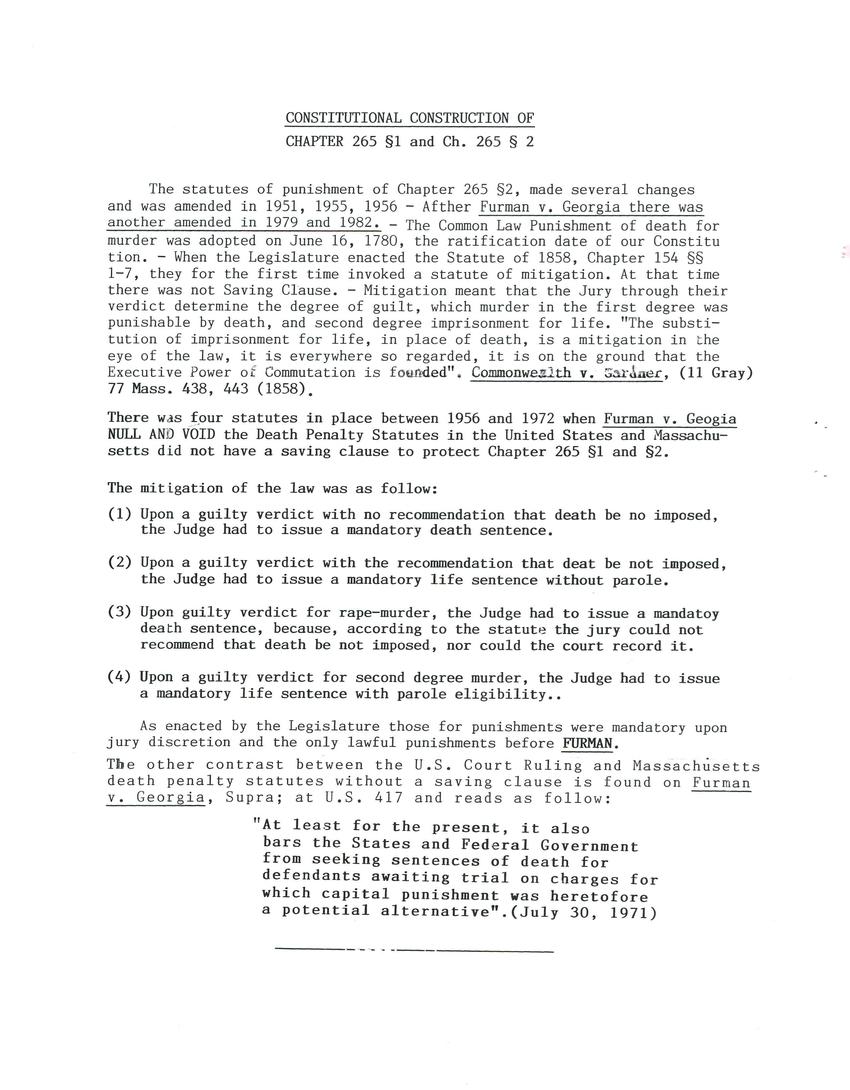
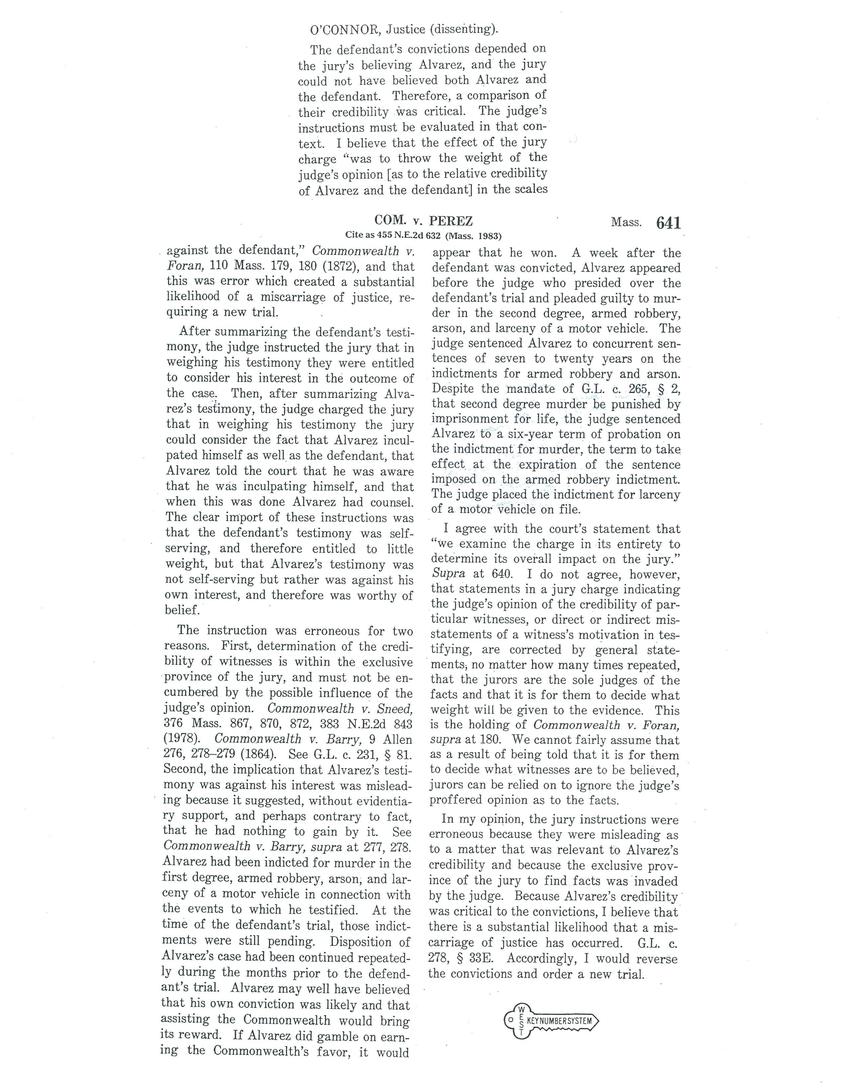

Replies (2)